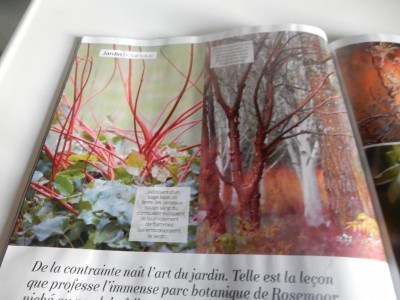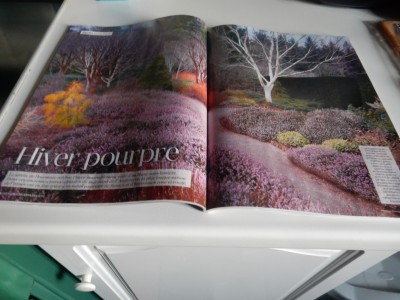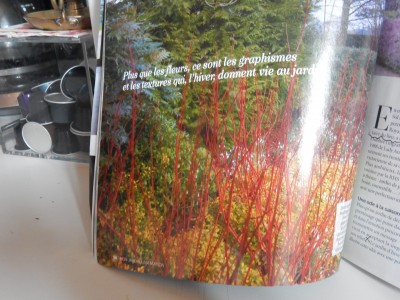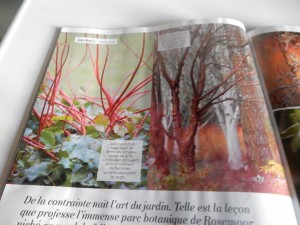
Oubliée l’ingratitude de ces terres du Devon héritées en 1988 de Lady Anne Palmer, qui avait consacré ses 30 dernières années à colorer la rigueur victorienne de sa collection de plantes du monde entier.
Le jardin d’hiver, dernier né de Rosemoor illustre cette idée avec beaucoup de poésie. En Angleterre, il y a 2 saisons : l’hiver et le mois de juillet, ironise l’adage local.
Le regard est frappé d’abord par la blancheur des bouleaux de l’himalaya, puis c’est l’écorse pourpre doré des érables canelles, l’acer griseum ajoute à la dramaturgie et les coussins de bruyère ondulent au pied de ces sculptures végétales.
L’hiver c’est la saison de la sobriété des essences et des couleurs. La palette se réduit à une harmonie de roses, de pourpre, de pastels de vert et bleus.
Ce ne sont plus les fleurs que l’on admire, mais les branches, les troncs le compagnonnage des textures douces et dures.
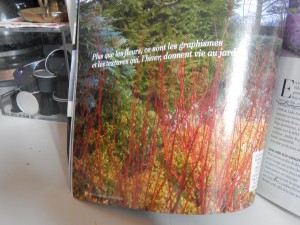
Le jardin est ouvert toute l’année …. More Rosemoor
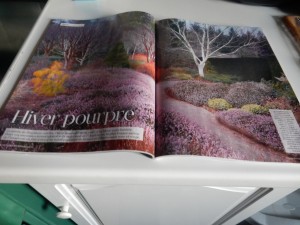
J ‘ai mis quelques photos tirées d’une revue ce qui explique que la qualité des photos ne soit pas très bonne, mais je voulais vous en donner une idée.MFR
Rosemoor in winter – Extrait du site https://www.rhs.org.uk/gardens/rosemoor/Rosemoor-in-pictures/Rosemoor-in-winter
 See the garden as you’ve never seen it before as part of our Magical Winter Garden Illuminations, 18 November – 7 January. See the Winter Garden lit by innovative, constantly colour-changing lights, creating spectacular effects.
See the garden as you’ve never seen it before as part of our Magical Winter Garden Illuminations, 18 November – 7 January. See the Winter Garden lit by innovative, constantly colour-changing lights, creating spectacular effects. The annual Winter Sculpture Exhibition returns from 19 November–19 February 2017. Pick up a trail and see how many sculptures you can discover; most are available for sale. Free, guided sculpture walks leave the Visitor Centre at 11.30am most Wednesday mornings.
The annual Winter Sculpture Exhibition returns from 19 November–19 February 2017. Pick up a trail and see how many sculptures you can discover; most are available for sale. Free, guided sculpture walks leave the Visitor Centre at 11.30am most Wednesday mornings.
 Interesting bark and stems are an asset in the winter garden. Prunus serrula has smooth, coppery bark, while birches stand out for their ghostly white trunks.
Interesting bark and stems are an asset in the winter garden. Prunus serrula has smooth, coppery bark, while birches stand out for their ghostly white trunks.
 Brussels sprouts stand tall in the Fruit & Vegetable Garden. Our award-winning Garden Kitchen restaurant uses fresh produce from the garden to create its dishes. Head Chef Greg and fruit and vegetable gardener Pete work closely to maximise the use of all this wonderful produce on our menus.
Brussels sprouts stand tall in the Fruit & Vegetable Garden. Our award-winning Garden Kitchen restaurant uses fresh produce from the garden to create its dishes. Head Chef Greg and fruit and vegetable gardener Pete work closely to maximise the use of all this wonderful produce on our menus.
 Visitors enjoying the aptly named Cornus sanguinea ‘Winter Beauty’ in the Winter Garden. This is under planted with charming Eranthis hyemalis AGM (winter aconite) with bright yellow cups surrounded with a ruff of leafy bracts.
Visitors enjoying the aptly named Cornus sanguinea ‘Winter Beauty’ in the Winter Garden. This is under planted with charming Eranthis hyemalis AGM (winter aconite) with bright yellow cups surrounded with a ruff of leafy bracts.
 The lake is a lovely backdrop to the spidery red flowers of Hamamelis mollis ‘Coombe Wood’. The glassy surface of the cold water reflects the surrounding trees and coloured stems of Salix and Cornus.
The lake is a lovely backdrop to the spidery red flowers of Hamamelis mollis ‘Coombe Wood’. The glassy surface of the cold water reflects the surrounding trees and coloured stems of Salix and Cornus.
 Plants on the cottage garden wall sparkle with frost. There is still plenty of structure in this garden during winter with upright Viburnum, the rounded form of Cistus and Potentilla and the branch patterns of large trees against the sky as a backdrop.
Plants on the cottage garden wall sparkle with frost. There is still plenty of structure in this garden during winter with upright Viburnum, the rounded form of Cistus and Potentilla and the branch patterns of large trees against the sky as a backdrop.
_940x627.jpg?width=520&height=346) As spring approaches, swathes of Narcissus bulbocodium appear in Lady Anne’s Arboretum. Their large, funnel-shaped trumpets have earned them the common name of hoop petticoat daffodil. Other good places to see early bulbs are the glasshouse in the Fruit and Vegetable Garden and the Cottage Garden.
As spring approaches, swathes of Narcissus bulbocodium appear in Lady Anne’s Arboretum. Their large, funnel-shaped trumpets have earned them the common name of hoop petticoat daffodil. Other good places to see early bulbs are the glasshouse in the Fruit and Vegetable Garden and the Cottage Garden.
 Dainty pink camellias in the Woodland Garden are a welcome reminder that spring is on the way. More camellias can be found throughout Rosemoor but especially in the Winter Garden and Stone garden. Hard frosts or snow do not generally last very long at Rosemoor and these tree ferns escape the worst by being on a slope allowing the cold to roll away. They are also protected by the other plants around them. DMS
Dainty pink camellias in the Woodland Garden are a welcome reminder that spring is on the way. More camellias can be found throughout Rosemoor but especially in the Winter Garden and Stone garden. Hard frosts or snow do not generally last very long at Rosemoor and these tree ferns escape the worst by being on a slope allowing the cold to roll away. They are also protected by the other plants around them. DMS

